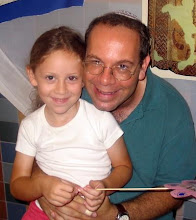by Elli Sacks
The year 1996 was, by far, the most difficult year of my life.
It had started on an amazing high point when I finally realized a personal dream, arriving in Israel and making aliyah on February 11th of that year. And it came crashing down two weeks later, when two of my closest friends -- Matt Eisenfeld ztz"l and Sara Duker ztz"l -- were killed in a brutal terrorist attack that left 26 people dead in the center of Jerusalem. A fortnight after I had arrived in Israel I was accompanying two caskets, draped in American flags, on an El Al flight that would take my friends back to their ultimate resting place in Avon, Connecticut.
To call Matt and Sara "my friends" is to vastly underestimate their importance in my life. Sara was my first serious girlfriend, and our relationship (rocky as it was) spanned a period of some two years together. I loved her deeply, and though our relationship as a couple was probably doomed from the start, I never lost that love for her as a person. After our romantic relationship ended, she remained a friend, and someone who I believed would forever play a part in my life.
As close as I was to Sara, I would have to admit that I was even closer to Matt. Matt was my spiritual brother. We worked together, learned Torah together, laughed together, jogged together, hiked together, read poetry together, and sang together in a Jewish a capella group that we both helped found. In college, we even drank wine and serenaded women together. Matt and I shared the inner workings of our souls -- our souls were bound up with one another. When he died, part of me died as well.
I spent much of that year crying, but I was eventually able to "return to life" thanks to the support of a wonderful group of friends (warning: your names will probably appear in this blog before long) who were able to connect me back with the "root of my life." Though I was temporarily living in Bnei Berak, I would relish the opportunity to travel to Jerusalem and daven at Yakar, where the eclectic and brilliant but profoundly humble rabbi, Mickey Rosen ztz"l, would infuse the melodies of the davening with such tremendous pathos that it moved me to tears. I would leave shul crying, but with the right sort of tears -- tears that connected me with my fellow petitioners, tears of which I was not ashamed. It felt so good to cry this way, as opposed to the bitter tears I often shed in solitude.
And all of this brings me around, by way of introduction, to how I first discovered the Mei ha-Shiloah (for a free pdf version of the sefer click here.) It was in one of Mickey Rosen's impassioned Friday night drashot that I first heard of the Ishbitzer Rebbe, R. Mordechai Yosef Leiner. I was intrigued by his portrayal of this Chassidic tzadik who eschewed the role of intermediary between God and his chassidim, demanding instead that people must stand before Hashem as individuals and bring their own unique personalities to bear on their service to the Eternal One. The Ishbitzer demanded in his followers not allegiance, but rather an honesty to their truest selves and a commitment to authenticity. This resonated deep within me. In the fall of 1997, I signed up for a beginner's course on Mei ha-Shiloach taught at Mechon Pardes by a wonderful teacher named Mimi Feigelson. (It was only much later on that I learned that Mimi had received personal semichah from Shlomo Carlebach. It would be years before she would assume the title "Reb" before her name.) The course only lasted a short while, but it played an immense role in my spiritual development.
What first impressed me about Mimi was that, for her, the texts of the Mei ha-Shiloah were not the cryptic linguistic puzzles that appeared to my eyes. For Mimi, each teaching of the Ishbitzer was a challenge to us of how we could live our lives differently. There were no codes to crack, rather words to reflect upon and then wait. Patience was definitely a part of learning Mei ha-Shiloah -- learning how not to rush in and begin deconstructing the text, but rather allowing the words to slowly work their way into you.
This lesson, Mimi expressed in a humorous and stunning reading of the words of the Shema (Deuteronomy 6:5): "Ve-hayu ha-devarim ha-eileh asher Anochi metzavchah ha-yom 'al levavekhah." "And these words, which I command you this day, shall be upon your heart." But how do we internalize the words which Hashem has commanded us "upon our hearts"? Leaving aside the usual metaphors associated with Torah learning, Mimi conjured up the incongruous image of a baked potato, upon it a slowly melting pat of butter. And in that moment of madness, all suddenly became clear. We learn these teachings to place them upon our hearts, to meditate upon their meanings, and to allow them to slowly sink in to the core of our very being...




No comments:
Post a Comment